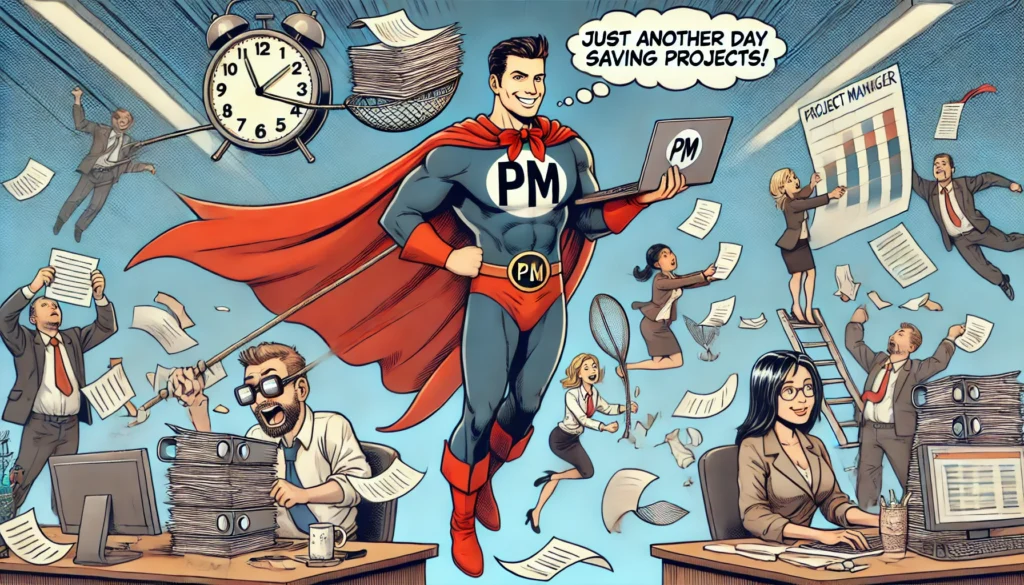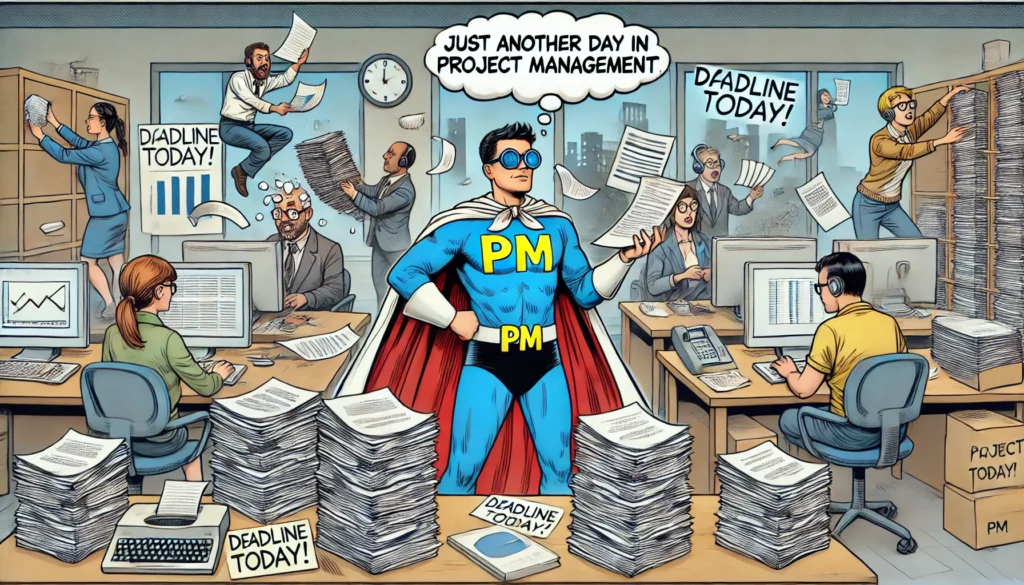Effective project management is a discipline that integrates processes, methodologies, and skills to achieve specific goals. Each project presents unique challenges that require appropriate strategies and tools. Effective project management involves not only understanding tools and techniques but also applying best practices that make project execution more efficient and predictable. By adhering to these practices, one can avoid many issues that could affect the timeliness and quality of deliverables. Success in project management hinges not only on technology and resources but primarily on management skills.

Table of Contents
Project Planning: Best Practices and SMART Goals
Project planning forms the cornerstone of any successful project. Good planning involves identifying objectives, allocating resources, and setting timelines. The SMART method (Specific, Measurable, Achievable, Relevant, Time-bound) stands out as one of the best practices in project management. It enables project managers to set clear and realistic goals that are measurable and achievable within a defined timeframe. Goals must be specific, measurable to track progress, achievable within available resources, relevant to the overall project aim, and time-bound to establish deadlines. This tool also aids in prioritization and ensures that every team member understands the objectives. A well-planned project increases success rates by minimizing unforeseen challenges.
The Role of the Project Manager in Effective Project Management
The project manager plays a crucial role in effective project management. Responsibilities include team coordination, progress monitoring, problem-solving, and ensuring project adherence to the plan. A project manager must possess a broad skill set, ranging from technical to soft skills like communication and conflict management. A proficient project manager not only supervises but also motivates the team to achieve goals by employing best practices in project management. Flexibility and adaptability in changing conditions are essential, while maintaining a clear vision and project objectives. The project manager is also responsible for resource management, budgeting, and stakeholder relations, requiring negotiation skills and strategic thinking.
Eisenhower Matrix: Key to Effective Time Management
The Eisenhower Matrix is a tool for managing priorities by categorizing tasks based on urgency and importance: urgent and important, important but not urgent, urgent but not important, and neither urgent nor important. This allows project managers to focus on what matters most, ensuring task timeliness and reducing stress associated with time management. The Eisenhower Matrix aids in better resource and time allocation, eliminating unnecessary tasks that add no value to the project. It is particularly useful in fast-paced environments where quick decision-making and effective time management are critical. Regular reviews of the matrix help adjust priorities as the project progresses, enhancing its efficiency.
Best Practices in Project Management: Timeliness as a Foundation for Success
Timeliness is a fundamental aspect of effective project management. Achieving objectives within a specified timeframe is crucial for project success. Project managers must monitor schedules, identify potential delays, and take corrective actions to keep the project on track. Timeliness affects client and stakeholder satisfaction and project costs. Missing deadlines can lead to additional expenses, loss of trust, and quality issues. Key to managing timeliness is using tools to monitor progress, such as Gantt charts and critical path methods. Regular schedule reviews and prompt responses to changes and problems help maintain project timelines.
“Developing a detailed plan is only half the battle. The other half is executing it despite all obstacles.”
Napoleon Bonaparte
Project Execution: Utilizing FUKO in Management
FUKO (Functionality, Usability, Costs, Responsibility) is a methodology that aids in managing project execution. It focuses on ensuring that the project meets functional requirements and is usable while controlling costs and clearly defining responsibilities. With FUKO, project managers can effectively oversee progress and respond to project changes. Functionality refers to whether the final product meets the set requirements. Usability assesses whether the product is practical and useful for users. Costs must be controlled to keep the project within budget. Responsibility means each team member knows their tasks and is accountable for their completion. FUKO helps monitor and control the project, ensuring all aspects are considered and managed efficiently.
Escalation Techniques in Engineering Projects
Problem escalation is a process that enables quick and effective resolution of issues that may affect project execution. Escalation techniques involve identifying problems, assessing their impact on the project, and communicating with the right individuals who can assist in resolving them. This ensures that problems are addressed swiftly and effectively, minimizing their impact on the project. It is important to apply escalation thoughtfully and responsibly to avoid unnecessary confusion and stress within the team. Regular status meetings and reports can help in early problem detection and corrective action before they become critical. Problem escalation is crucial for keeping the project on track and preventing delays and budget overruns.
Responsibility in Projects: How to Effectively Manage a Team
Responsibility in a project is a key element of team management. Each team member must know their tasks and be accountable for their execution. The project manager must monitor progress, provide support, and motivate the team to achieve goals. Clearly defining roles and responsibilities prevents confusion and conflicts within the team. Regular meetings, clear communication, and tools for tracking progress help maintain a high level of responsibility. The project manager should also promote a culture of responsibility, where each team member feels obligated to achieve the best results. A well-managed team with clearly defined responsibilities works more efficiently and can achieve better outcomes.
Building Effective Project Teams
An effective project team collaborates, shares knowledge, and supports each other in achieving goals. The project manager must ensure good communication, resolve conflicts, and build trust within the team. Good relationships among team members are crucial for effective collaboration. Regular meetings, shared goals, and clearly defined tasks help build effective teams. The project manager should also invest in team skill development through training and mentoring. An effective project team is motivated, well-organized, and capable of quickly responding to changes and challenges. This allows the team to work more productively and achieve better results.
Evaluating Project Success: Best Practices and Future Insights
Evaluating project success is a key aspect of project management. It involves analyzing achieved results, comparing them with set goals, and drawing insights for the future. This process allows for identifying project strengths and areas needing improvement. Regular evaluation of project success helps in continuously improving the project management process. Project managers should use various evaluation tools and methods, such as SWOT analysis, cause-and-effect diagrams, and project retrospectives. This helps identify what worked well and what needs improvement, allowing for continuous enhancement of the project management process. Insights from project success evaluations should be documented and used in future projects to avoid repeating the same mistakes and leverage best practices.

FAQ
Project management is a discipline involving the planning, organizing, motivating, and controlling of resources, procedures, and protocols to achieve specific project goals.
Best practices in project management include using the SMART method for goal setting, managing priorities with the Eisenhower Matrix, effective planning and monitoring of the project, utilizing FUKO, and clearly defining roles and responsibilities within the team.
SMART is a goal-setting method that stands for: Specific, Measurable, Achievable, Relevant, and Time-bound. It helps in defining clear and realistic goals.
A project manager coordinates the project team, monitors progress, solves problems, manages resources and budget, and maintains stakeholder relationships. They motivate the team and ensure the project is executed according to plan.
Eisenhower Matrix, also known as the Eisenhower Box, is a priority management tool that divides tasks into four categories: urgent and important, important but not urgent, urgent but not important, and neither urgent nor important.
Timeliness ensures that project goals are achieved within a specified timeframe, impacting client satisfaction, cost control, and quality of execution. It helps avoid delays and additional costs.
FUKO is a project management methodology focusing on functionality, usability, costs, and responsibility. It helps in monitoring progress and responding to changes in the project.
Escalation techniques involve identifying problems, assessing their impact on the project, and communicating with the right individuals who can assist in resolving them. This enables quick and effective problem resolution.
Responsibility in a project involves clearly defining roles and tasks for each team member. The project manager monitors progress, provides support, and motivates the team to ensure everyone feels accountable for their tasks.
Effective project teams are characterized by good communication, collaboration, knowledge sharing, and mutual support. The project manager should invest in team skill development, resolve conflicts, and build trust.
Evaluating project success involves analyzing achieved results against set goals. Various evaluation tools, such as SWOT analysis and project retrospectives, are used to draw insights and improve processes in future projects.
